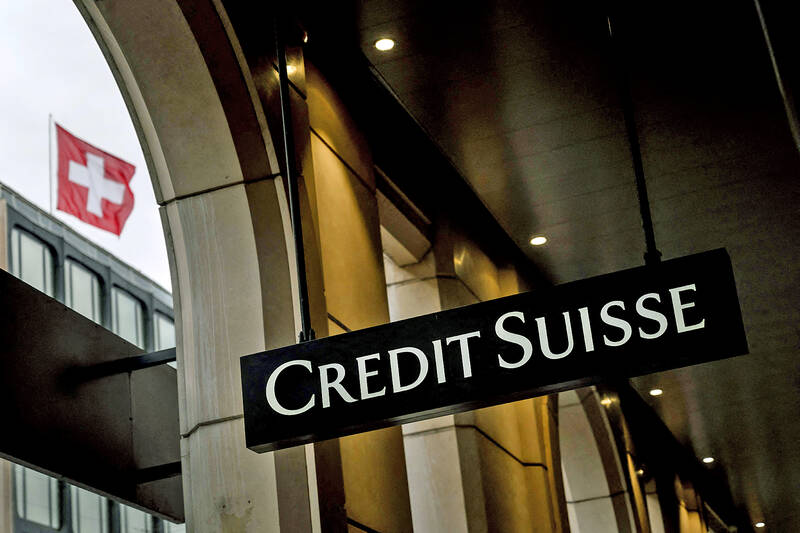More than 70 percent of local banks have stopped selling bonds or structure notes issued by Credit Suisse Group AG, while the remainder has either avoided recommending the Swiss company’s products or only make them available to professional investors, the Financial Supervisory Commission (FSC) said on Thursday, citing a recent survey.
Battered by a series of scandals, rumors of financial trouble and plunging shares, Credit Suisse has been at the center of market turmoil in recent weeks. Chief executive officer Ulrich Koerner early this month acknowledged that the bank was facing a “critical moment” in its latest restructuring plans.
Credit Suisse’s credit default swaps (CDS), the cost of insuring the bank’s bonds against default, climbed above 300 basis points last week amid concerns about the Swiss lender’s financial health.

Photo: AFP
“Some clients are cashing out their investment in Credit Suisse and we do not see any liquidity issue for the Swiss company,” Banking Bureau Deputy Director-General Phil Tong (童政彰) told an online news conference.
Credit Suisse’s products are available to retail and professional investors, with retail investors buying the most, Tong said.
If clients suffer investment losses when they redeem their Credit Suisse holdings, local banks would usually offer some compensation such as a discount in handling fees, Tong said.
The commission has asked banks to restrict sales of Credit Suisse’s financial products to 20 percent of their total sales, Tong said.
The commission did not disclose local banks’ combined exposure to Credit Suisse.
Local life insurers have a combined exposure of NT$110.2 billion (US$3.46 billion) to Credit Suisse, mainly in the form of bond holdings, the commission said.
Insurers do not need to recognize credit losses since those bonds remain investment-grade rated and Credit Suisse still pays yields normally, it said.

Taiwan Semiconductor Manufacturing Co (TSMC, 台積電) founder Morris Chang (張忠謀) yesterday said that Intel Corp would find itself in the same predicament as it did four years ago if its board does not come up with a core business strategy. Chang made the remarks in response to reporters’ questions about the ailing US chipmaker, once an archrival of TSMC, during a news conference in Taipei for the launch of the second volume of his autobiography. Intel unexpectedly announced the immediate retirement of former chief executive officer Pat Gelsinger last week, ending his nearly four-year tenure and ending his attempts to revive the

Taiwan would remain in the same international network for carrying out cross-border payments and would not be marginalized on the world stage, despite jostling among international powers, central bank Governor Yang Chin-long (楊金龍) said yesterday. Yang made the remarks during a speech at an annual event organized by Financial Information Service Co (財金資訊), which oversees Taiwan’s banking, payment and settlement systems. “The US dollar will remain the world’s major cross-border payment tool, given its high liquidity, legality and safe-haven status,” Yang said. Russia is pushing for a new cross-border payment system and highlighted the issue during a BRICS summit in October. The existing system

Convenience store operator Lawson Inc has registered trademarks in Taiwan, sparking rumors that the Japanese chain is to enter the local market. The company on Aug. 30 filed trademarks for the names Lawson and Lawson Station, according to publicly available information from the Ministry of Economic Affairs’ Intellectual Property Office. The product categories on the application include some of Lawson’s top-selling items for use in the convenience store market. The discovery has led to speculation online that the popular Japanese chain is to enter the Taiwanese market. However, some pointed out that it might be a preemptive application to avoid others from co-opting the

Taiwan Semiconductor Manufacturing Co (TSMC, 台積電) is expected to grow its revenue by about 25 percent to a new record high next year, driven by robust demand for advanced technologies used in artificial intelligence (AI) applications and crypto mining, International Data Corp (IDC) said yesterday. That would see TSMC secure a 67 percent share of the world’s foundry market next year, from 64 percent this year, IDC senior semiconductor research manager Galen Zeng (曾冠瑋) predicted. In the broader foundry definition, TSMC would see its market share rise to 36 percent next year from 33 percent this year, he said. To address concerns